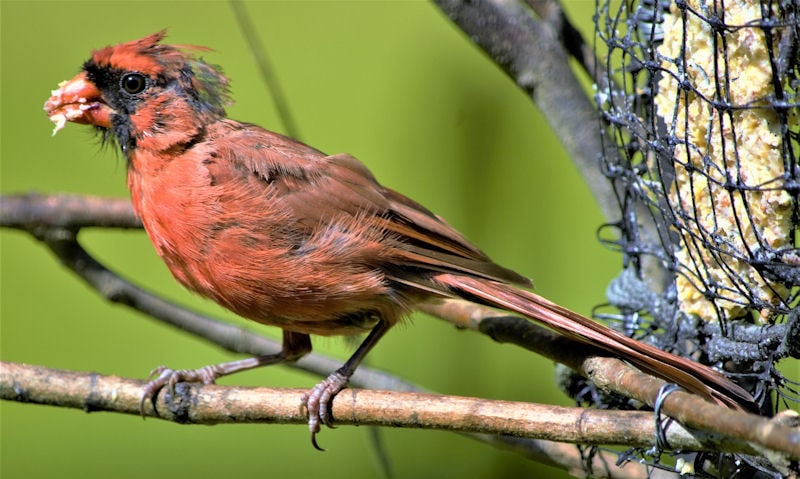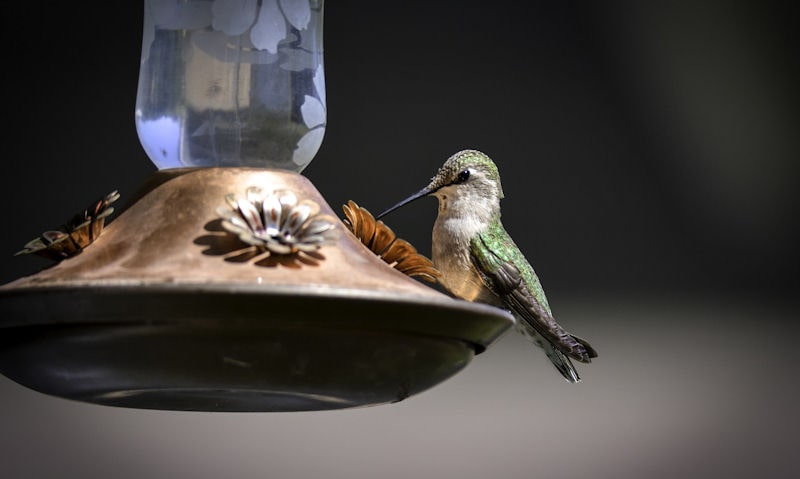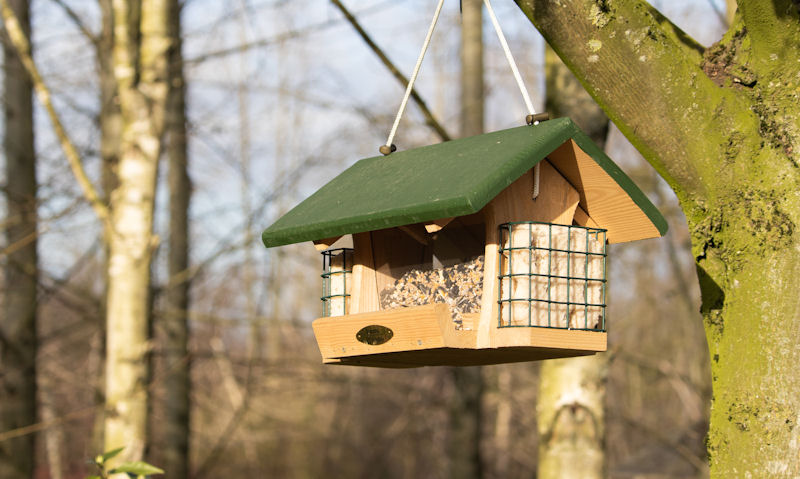Can you feed birds Suet in the Summer
Concern over wild bird suet in summertime is a fair one, as suet is beef fat after all, thus can be seen to melt under the heat of the summer sun.
You can feed birds suet in the summer but you must use caution when you do. Quality wild bird suet must be store-bought, whilst promoted as for all year round. Avoid homemade suet at this time of year as it melts far easier, with an option of taking down suet bird feeders temporally to avoid an heatwave.
Birds still need an intake of high energy bird food out of your bird feeders at this time of year, and suet will certainly provide them this.
Suet can be used in summertime with extra caution used. Suet is made up mostly of rendered beef fat, and as it heats up it will begin to melt. It won't return to a fatty liquid, but it will show signs of melting, including a buildup of grease.
Grease can be an issue with a birds plumage as fat can be entangled in their feathers, stopping birds taking off, so will starve.
Offer backyard birds quality, store-bought branded fat balls, pellets or suet cakes which are better for birds when using more quality ingredients - and guaranteeing an extended expiry date, even if unsealed.
Heat of the sun can begin the process of suet germinating within a few days in summer, with up to week in winter. Its then possible bacteria will be ingested by birds in summer if the suet is not replaced every few days or so.
Less suet can be used at a time to reduce waste, but a shaded area in the backyard is certainly going to extend the suet 'best before' date, that's for sure.
Suet suspended outdoors in suet bird feeders will soften up, with a little grease showing on feeders, which is OK providing you clean suet bird feeders more regularly in summer.
Can feed birds suet in summer
Despite what you might think, wild bird suet can be fed to birds in the summer, but you must still be cautious when doing so.
Whilst remaining popular all year round, in summertime or in warmer weather suet has a knack of melting in the heat. Quality suet can hold, with cheaper suet options, which is beef fat if you didn't know - can begin to melt soon after its left outside.
Birds can quickly eat up suet in balls, cake or suet pellet form, but it can go soft before its even touched.
If offering wild birds suet in your yard over the summertime, I would look to leave the suet out in the heat for short time as possible.
What that would involve is you only offering the suet at the busiest times, when birds may feed in a frenzy first thing in the morning - though to offer suet all through the morning would be the better option.
Don't depend on certain times of day when its least hot, because in reality that won't work with suet, or any wild bird food made to be outdoors.
What you can do is favor a shaded spot to hang your suet cake feeder, or why not throw suet pellets on the ground in a shaded spot.
Quality suet is for all year
While birds come to depend on suet more in wintertime to restore energy lost whilst foraging in the cold winter days, suet can help maintain a balanced diet in summer.
Its therefore possible to buy quality store-bought suet cakes or pellets for all year round.
Suet would be made by a well known brands of wild bird food, with the formula offering a suet that can be fed to birds in the winter, with a higher melting point over the cheaper options.
What that means for you is, is a less messy suet bird feeder due to grease coating the inner bird feeder cage.
Buy suet for wild birds labeled as all year, because then you can feed birds suet all through the spring and summertime, with little issues.
I will say suet must remain in the shade while being suspended within a proper suet cake bird feeder, or any other kind. To feed wild birds in your yard on the ground can rapidly speed up the germination process, so continue to use suet feeders in summer.
You will only have a few days in the summer for the suet to be at its best, while thereafter the suet can begin to show signs of rot, with bacteria growing on the surface.
Avoid raw or homemade
What options you have to feed wild birds suet is by making it yourself. Now I will say some people do, but I must say the store-bought options remain the safest.
When making suet at home, beginning with raw beef fat, this recipe is guaranteed to not hold its shape very well - as you'll soon see as its left out under the sun.
Avoid raw suet because this will melt away within hours, whilst beginning to rot in the heat.
Homemade suet can hold its form in colder weather, but you'll find to have a real problem whilst you try to keep it stored outdoors in the best possible way.
To use homemade suet cakes or fat balls, these will loose their structure being out in the heat; while soon after these same suet cakes or balls will crumble, melt or create a real greasy mess.
Homemade suet for wild birds continues to be a lot of fun in colder months, but for now stick to the quality store-bought suet, labeled for use by birds all year round.
Suet can rot quickly in direct sun
What suet tends to do more than other popular bird food such as seeds, nuts or even dried mealworms, is rot quickly in direct sunshine.
All wild bird food has an expire date, with that same date remaining true only if the sealed up suet in a tub or package is left unopened, and never to be opened at all.
What a person often thinks is suet won't rot so soon while left out in the bird feeders, exposed to the elements in the yard. While suet cakes can last a whole year when sealed up, that is reduced to a few months or weeks once opened.
You then have this time or less to use up all your wild bird food before it goes past its expire date when opened.
And remember that only applies to wild bird suet that stays sealed up in its original package - because once its outdoors you will only have a few days before the suet begins to rot.
Birds can be seen to feed off bacteria riddled suet, thus its up to you to remove them all out of your yard, to replace them with a new batch once or twice weekly.
Take suet down in heatwave
I will say if you reside in a hot State with a high or low humidity, this is not the sort of conditions where wild bird suet can live in.
Humidity can cause dampness over the suet left out throughout the year, whilst low humidity can certainly speed up any germination.
If you live in Texas, Florida or any State that is hot all year, then perhaps these instructions don't apply to you. As you won't be able to keep suet hanging up in the yard long enough, before it can all be eaten up in a short time period.
However, other States that do experience seasonal weather, can indeed take down their suet bird feeders during a tough heatwave.
Don't expect to leave the suet in all its forms to be left out on the ground, unless its on the lawn in a shaded area.
Once the occasional heatwave hits during the summertime, it can be then when you do take your suet down. Store the suet in the bird feeders in a cool, dry place - then proceed to hang them back up once the weather normalizes.
Heatwave's can be for a short period, so I don't expect wild birds to miss out for too long. This can depend on you continuing to leave out their other favorites so they can continue to feed.
With that in mind, its essential to always leave out a source of fresh water near the suet, or bird feeders in general so birds can hydrate - or indeed preen their greasy suet covered feathers, if this mishap were to happen.
Conclusion
Suspicion of suet being used in summertime is within reason, as suet does have a tendency to melt somewhat under the heat of the summer sun.
This can be true for cheaper wild bird suet that tends to have lower melting point, thus is seen to melt or loose its shape in only warmer conditions.
You can feed birds suet in the summer providing you are using a quality suet in cake, fat ball or pellet form - if its designed and promoted as suet for feeding birds all year round in the backyard.
What that signifies is the suet is made to withstand the heat, so isn't likely to melt so easy.
Suet can be a nuisance to birds if they manage to get it on their plumage, as their feathers can be seen to get all mangled up in the grease, in which is freshly melted out of the suet in use.
Its vital to buy suet to suspend in bird feeders only that can't melt so easy, thus remains a safer options for your backyard birds.
In cold, winter months wild bird suet can last a lifetime, but like most things in life, they don't last very well in the heat. Worst still in direct sunshine but a cooler shaded area in the yard must be prioritized to hang suet feeders.
Suet can and will rot quite quickly in the summer, whilst this same suet must be eaten by birds within days before the germination process kicks in.
On the hottest days of the year, or if experiencing a heatwave in the summer, do pull down the suet feeders, or clean up any loose suet over the ground, temporarily.


